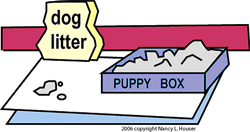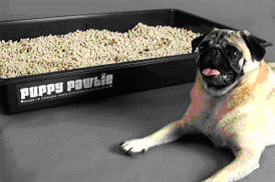|
Free Online Course Home Training Benefits Potty Training Barking Nipping & Biting About Us
Litter Box Training For Your Dog
Hi and welcome to some complimentary information on Litter Box Training, Most people are probably people are very familiar with litter box training of cats, but many people don’t realize the same technique can be used with dogs. Simply because of size, this process works best with toy or small dogs, and is usually used when people live in apartments or are unable to let their dogs outside at regular intervals. Litter box training can be used as a back-up plan if the dog may need to be left in the house for long periods of time. Litter box training can be completed using the following strategies: · Designate a spot in the house or apartment that is a litter box area. An uncarpeted area is ideal, or simply lay some heavy plastic sheeting like paint drop cloths under the litter box. · Use a bit of commercial kitty litter or shredded newspaper in the bottom of the box. · When you notice the dog or puppy becoming agitated, whining, circling around or sniffing take them to the litter box and place them inside. · If they don’t relieve themselves, take them out of the box and away from the area until they start the behaviors again. · When they relieve themselves in the box provide lots of praise. · Some dogs and puppies will need to have the scent of the urine left in the box until they understand that this is the toilet area.
The key to litter box training is that you have to actively be watching the dog or puppy around the times that you know that it will relieve itself. This is usually 10-20 minutes after eating, right after waking from a nap, or shortly after drinking water. Many dogs and puppies also have to urinate after or during exercise periods. Watch for signs that your dog or puppy is suddenly disinterested in the game and appears to be more engaged in sniffing around the room; this is usually a sign that they will need to toilet. One problem with litter box training is that unlike a confined training method like crate training, you have no way to be in constant supervision of the dog. A way to overcome this is to keep the dog on a short leash, three to four feet at the most, and keep it attached to you at all times. While this may be a bit difficult at first, it will help you monitor the dog or puppy at all times, and will allow you to know when to take it to the litter box. The same process can be used at night by tethering the dog to a piece of furniture in the bedroom and providing a doggy bed or blanket to sleep on. When you hear the puppy or dog start to whine or move around, simply take them to the litter box and then return them to the bed area. The advantage to litter box training is that it allows the dog or puppy to recognize where you what it to eliminate. A litter box can also be used outdoors to prevent difficult yard clean-ups. The major disadvantage to litter box training is that dogs, unlike cats, do not cover the waste with the litter. The dog litter box will quickly become very foul smelling if not cleaned as soon as the dog uses it. Dogs that have been previously trained to only go outside to toilet may be very difficult to litter train, and it may not be advisable to try this method with previously potty trained dogs.
Need Some More Help ? I hope this short outline introduction to Litter Box Training has been helpful to you. For further information, please consider the Insider's Guide To The Boston Terrier This package includes detailed training information plus other extensive resources for best caring for Your Boston Terrier. Just Click Here below for more details. Bye for now. Warmly,
|


